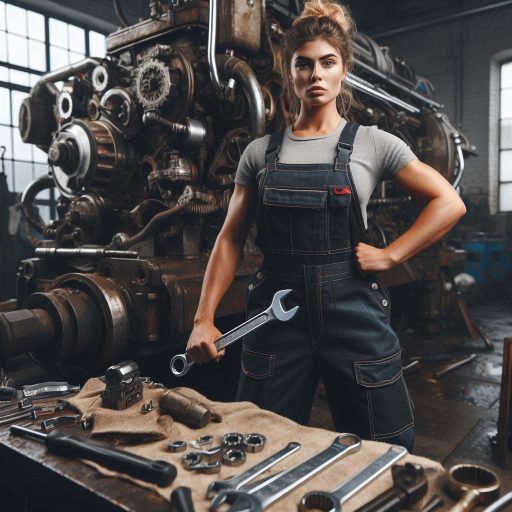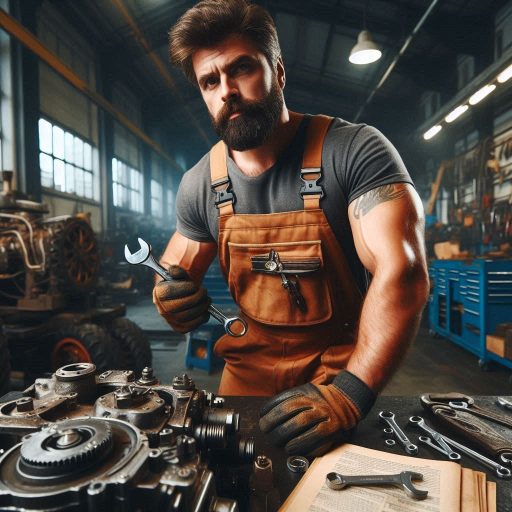Introduction
Importance of industrial machinery mechanics in various industries
Industrial machinery mechanics are essential in various industries, from manufacturing to energy production.
They ensure that machines run efficiently, reducing downtime and maximizing productivity.
Skilled professionals in this field are highly sought after, as businesses increasingly rely on complex machinery for daily operations.
The demand for skilled professionals in this field
The demand for industrial machinery mechanics is growing due to technological advancements and automation in various sectors.
Companies need experts who can maintain, repair, and optimize machinery to prevent costly breakdowns and keep operations running smoothly.
Key skills needed for industrial machinery mechanics
Key skills required for industrial machinery mechanics include:
- Mechanical Aptitude: Understanding how machines and mechanical systems work is fundamental.
- Problem-Solving Skills: Quickly diagnosing and fixing issues is critical to minimize downtime.
- Technical Knowledge: Familiarity with tools, machinery, and technical documentation is essential.
- Attention to Detail: Precision in inspecting, maintaining, and repairing equipment prevents future failures.
- Communication Skills: Effective communication helps collaborate with other team members and understand technical manuals.
These skills form the foundation for a successful career in industrial machinery mechanics, contributing to the efficient operation of industries worldwide.
Mechanical Skills
Ability to Understand and Work with Complex Machinery
Industrial machinery mechanics must understand and work with complex machinery.
They need to grasp intricate designs and functions of various machines.
Reading and interpreting technical manuals and schematics is crucial.
Mechanics often work with advanced equipment that requires detailed knowledge of its operations.
Being able to disassemble, inspect, and reassemble machinery is a key skill.
Proficiency in using diagnostic tools and software is also essential for understanding machinery.
Knowledge of Mechanical Systems and Components
A solid knowledge of mechanical systems and components is vital for industrial machinery mechanics.
They should be familiar with various mechanical systems, including engines, transmissions, and hydraulic systems.
Understanding how different components interact helps in diagnosing issues and performing repairs.
Mechanics must know about gears, bearings, pumps, and valves, as well as their functions within a system.
Familiarity with electrical systems, sensors, and controls also enhances their ability to maintain and repair machinery.
Troubleshooting Mechanical Issues Effectively
Effective troubleshooting is a core skill for industrial machinery mechanics.
Mechanics must identify the root cause of mechanical issues accurately.
This involves systematically analyzing symptoms and conducting tests to pinpoint problems.
They should be adept at using diagnostic tools, such as multimeters and pressure gauges.
Problem-solving skills help in developing effective solutions to machinery issues.
Mechanics must also be able to perform repairs quickly to minimize downtime.
Experience and a methodical approach improve their ability to troubleshoot and resolve mechanical problems efficiently.
Industrial machinery mechanics require specific skills to succeed in their roles.
They must understand and work with complex machinery, possess a deep knowledge of mechanical systems and components, and troubleshoot issues effectively.
Mastery of these skills ensures efficient operation, maintenance, and repair of industrial equipment.
Read: Surveying and Mapping Technician: Job Satisfaction
Technical Knowledge
Understanding of Electrical and Electronic Systems
Industrial machinery mechanics need a solid understanding of electrical and electronic systems.
They work with machines that rely on complex circuitry and components.
Technicians must diagnose electrical issues and repair circuits effectively.
Familiarity with electrical schematics and wiring diagrams is essential.
Mechanics use multimeters and other tools to test and troubleshoot electrical problems.
Knowledge of electronic control systems, sensors, and automation is also crucial.
This understanding helps in maintaining and repairing machinery that integrates both mechanical and electrical systems.
Proficiency in Reading Blueprints and Technical Manuals
Proficiency in reading blueprints and technical manuals is vital for industrial machinery mechanics.
Blueprints provide detailed diagrams of machine components and assembly instructions.
Mechanics use these diagrams to guide repairs and maintenance tasks.
Technical manuals offer essential information on machinery operation, troubleshooting, and specifications.
Being able to interpret these documents accurately ensures proper handling and repair of machinery.
Mechanics must stay updated on any changes or new versions of manuals.
This skill helps technicians perform tasks efficiently and accurately, minimizing downtime and errors.
Knowledge of Safety Regulations and Procedures
Knowledge of safety regulations and procedures is crucial for industrial machinery mechanics.
They work in environments with potential hazards such as high voltage, moving parts, and heavy machinery.
Understanding and following safety protocols helps prevent accidents and injuries.
Mechanics must be familiar with personal protective equipment (PPE) requirements and safe operation procedures.
They need to know how to handle hazardous materials and emergency response protocols.
Adhering to safety regulations ensures a safe work environment and compliance with legal standards.
Regular training and updates on safety practices are essential for maintaining a safe working environment.
Industrial machinery mechanics require a comprehensive skill set.
Understanding electrical and electronic systems is essential for working with complex machinery.
Proficiency in reading blueprints and technical manuals ensures accurate repairs and maintenance.
Knowledge of safety regulations and procedures is crucial for working safely and effectively.
Developing these skills through education, training, and hands-on experience prepares individuals for a successful career in this field.
Read: Importance of Accuracy in Surveying and Mapping
Problem-Solving Skills
Industrial machinery mechanics must possess a range of skills to perform their duties effectively.
Key skills include the ability to identify and solve mechanical problems, critical thinking for diagnosing issues, and adaptability to handle unexpected challenges.
Here‘s a detailed look at these essential skills.
Ability to Identify and Solve Mechanical Problems Efficiently
Mechanics need a keen eye for detecting mechanical problems early.
They must be able to:
- Diagnose Problems Quickly: Efficient problem identification involves recognizing symptoms of mechanical issues.
Timely detection prevents further damage and reduces downtime. - Use Diagnostic Tools: Mechanics utilize various tools like gauges, meters, and diagnostic software to pinpoint problems accurately. Proficiency with these tools is essential.
- Perform Troubleshooting: They systematically troubleshoot issues to find the root cause. This methodical approach helps in applying the correct solutions promptly.
- Repair or Replace Parts: Once problems are identified, mechanics must quickly repair or replace faulty components.
Efficiency in this process minimizes operational disruptions.
Efficient problem-solving skills ensure that machinery operates smoothly and reduces operational interruptions.
Critical Thinking Skills to Diagnose Issues and Develop Solutions
Critical thinking is crucial for diagnosing complex machinery issues and devising effective solutions.
Transform Your Career Today
Unlock a personalized career strategy that drives real results. Get tailored advice and a roadmap designed just for you.
Start NowMechanics need to:
- Analyze Symptoms: They must analyze various symptoms and correlate them with possible causes. This analysis helps in forming accurate diagnoses.
- Evaluate Multiple Solutions: Mechanics consider different repair options and evaluate their feasibility.
They choose the best solution based on effectiveness and cost. - Think Logically: Logical thinking helps in understanding how different parts interact and how faults might affect overall performance.
This understanding is key to accurate diagnosis. - Apply Technical Knowledge: They apply their technical knowledge to solve problems.
This knowledge includes understanding machinery design, operation, and common failure modes.
Critical thinking ensures that mechanics address issues effectively and prevent recurring problems.
Adaptability to Handle Unexpected Challenges
Adaptability is vital in the dynamic field of machinery maintenance.
Mechanics often face unforeseen challenges and must be able to:
- Adjust to New Technologies: As technology evolves, mechanics must quickly learn and adapt to new machinery and diagnostic tools.
Staying updated with technological advancements is essential. - Handle Emergencies: Unexpected breakdowns or malfunctions can occur.
Mechanics must remain calm and adapt their approach to handle emergencies effectively. - Work in Varying Conditions: Mechanics may work in different environments, including harsh or confined spaces.
Adaptability ensures they perform effectively regardless of conditions. - Innovate Solutions: When standard solutions don‘t work, mechanics must think creatively to develop new strategies.
Flexibility in problem-solving is crucial for overcoming unique challenges.
Adaptability allows mechanics to maintain efficiency and effectiveness in a constantly changing work environment.
Read: Networking Tips for Surveying and Mapping Professionals
Attention to Detail
Precision in Measuring and Calibrating Machinery
Precision is crucial for industrial machinery mechanics when measuring and calibrating equipment.
Accurate measurements ensure that machinery operates within specified tolerances.
Mechanics use precision tools like micrometers, calipers, and gauges to perform these tasks.
They calibrate machines to maintain consistent performance and prevent errors.
Regular calibration helps avoid breakdowns and maintains product quality.
Understanding the mechanical principles behind calibration is essential for effective adjustment.
Precision in this area prevents costly production issues and enhances machinery reliability.
Thoroughness in Inspecting and Analyzing Equipment
Thoroughness in inspecting and analyzing equipment is vital for machinery mechanics.
Detailed inspections help identify wear, damage, and potential failures.
Mechanics perform visual inspections, listen for unusual noises, and use diagnostic tools.
They analyze equipment performance data to spot irregularities.
A methodical approach ensures that no issues are overlooked.
Thorough analysis supports timely repairs and maintenance, reducing the risk of unexpected breakdowns.
It also extends the lifespan of machinery and ensures operational efficiency.
Focus on Quality Control
Focus on quality control is essential for ensuring machinery operates correctly.
Mechanics implement quality control measures to verify that equipment meets performance standards.
They regularly test machinery under operational conditions to ensure proper functioning.
Quality control involves monitoring output quality and making necessary adjustments.
Mechanics must be meticulous in checking for deviations and inconsistencies.
Their attention to detail helps prevent defects and maintains high production standards.
Effective quality control safeguards product integrity and enhances overall manufacturing processes.
Importance of Calibration and Quality Control
Calibration and quality control are integral to machinery maintenance.
Proper calibration ensures that machines operate at optimal levels, reducing errors and enhancing productivity.
Quality control checks confirm that machinery performs as intended and meets safety standards.
Both skills prevent costly disruptions and ensure smooth operations.
Mechanic‘s expertise in these areas supports reliable and efficient machinery performance.
They play a key role in maintaining consistent production quality and operational excellence.
Read: Top Surveying and Mapping Technician Employers

Communication Skills
Industrial machinery mechanics require a diverse set of skills to excel in their roles.
Effective communication, clear technical explanations, and collaboration with other professionals are crucial for success.
Mastering these skills enhances job performance and contributes to efficient machinery maintenance.
Effective Communication with Team Members and Supervisors
Effective communication is essential for industrial machinery mechanics.
Mechanics must relay information clearly to team members and supervisors.
They need to provide updates on repair progress and maintenance needs.
Good communication ensures that everyone is on the same page regarding machinery issues and solutions.
It also helps in building a cohesive team and preventing misunderstandings.
Clear Explanation of Technical Issues and Solutions
Mechanics must be able to explain technical issues and solutions in simple terms.
They often deal with complex machinery and must break down problems for others.
Providing clear explanations helps supervisors and team members understand the nature of the issues.
It also ensures that everyone is aware of the proposed solutions and their implementation.
Clear communication of technical details aids in troubleshooting and prevents errors.
Collaboration with Other Professionals
Collaboration with other professionals is vital for coordinating maintenance schedules.
Mechanics frequently work with engineers, electricians, and other specialists.
Effective collaboration ensures that all aspects of machinery maintenance are addressed.
Mechanics must coordinate schedules to minimize downtime and avoid conflicts.
Working well with other professionals helps in implementing comprehensive maintenance strategies and resolving complex issues.
Developing Active Listening Skills
Active listening is a key component of effective communication.
Mechanics must listen carefully to team members and supervisors to understand their concerns.
This helps in accurately assessing problems and identifying appropriate solutions.
Active listening also fosters better teamwork and helps in addressing issues promptly.
Documenting Communication and Decisions
Accurate documentation of communications and decisions is essential.
Mechanics should keep detailed records of discussions, repairs, and maintenance schedules.
Documentation provides a reference for future issues and helps in tracking progress.
It also supports transparency and accountability in machinery maintenance.
Read: CAD Technician Salary: What to Expect in the USA
Physical Stamina
Industrial machinery mechanics require a range of physical skills to perform their job effectively.
Key skills include the ability to lift heavy machinery, endurance in challenging environments, and physical dexterity for intricate tasks.
Each skill plays a crucial role in ensuring success and efficiency in the field.
Ability to Lift Heavy Machinery and Tools
Mechanics frequently lift and maneuver heavy machinery and tools.
They must handle equipment that can weigh hundreds of pounds.
Proper lifting techniques and physical strength are essential to prevent injuries and perform tasks efficiently.
Mechanics use tools like hoists and cranes to assist in lifting, but manual lifting remains a significant part of the job.
Transform Your Career Today
Unlock a personalized career strategy that drives real results. Get tailored advice and a roadmap designed just for you.
Start NowEndurance to Work in Challenging Environments
Endurance is crucial for mechanics who work in physically demanding and challenging environments.
They often work in factories, warehouses, and outdoor sites with varying conditions.
These environments can be noisy, dusty, or involve extreme temperatures.
Mechanics need to remain focused and efficient despite these challenging conditions.
Stamina helps them sustain long hours of work without compromising performance.
Physical Dexterity for Navigating Tight Spaces
Physical dexterity is essential for navigating tight spaces and working on intricate machinery.
Mechanics often reach into confined areas to inspect or repair machinery.
Precision and coordination are required to handle small parts and tools effectively.
They must be able to manipulate delicate components and perform tasks that require fine motor skills.
Good hand-eye coordination and problem-solving abilities are vital for success in these situations.
Time Management Skills
Efficient Organization of Tasks and Maintenance Schedules
Efficient organization of tasks and maintenance schedules is vital for industrial machinery mechanics.
They must plan and manage their work effectively to ensure that machinery is maintained and repaired on time.
Mechanics often handle multiple tasks, such as routine maintenance, emergency repairs, and inspections.
A well-organized schedule helps them balance these responsibilities and avoid delays.
Using maintenance management software or checklists can streamline their workflow and ensure no tasks are overlooked.
Prioritizing tasks based on the condition of the equipment and the urgency of repairs ensures that critical issues are addressed promptly.
Efficient organization not only prevents unexpected breakdowns but also enhances overall productivity.
Prioritization of Maintenance and Repair Projects
Prioritization of maintenance and repair projects is crucial in the role of an industrial machinery mechanic.
Mechanics need to assess which projects require immediate attention and which can be scheduled for later.
They often use factors such as equipment condition, production schedules, and safety risks to determine priority.
Addressing high-priority issues first helps prevent major disruptions and ensures the most critical equipment operates efficiently.
Effective prioritization also involves communicating with other team members and departments to align repair schedules with production needs.
By focusing on the most pressing maintenance tasks, mechanics can minimize downtime and maintain operational efficiency.
Ability to Work Under Pressure and Meet Deadlines
The ability to work under pressure and meet deadlines is essential for industrial machinery mechanics.
They often face unexpected breakdowns and urgent repair requests that require swift action.
Working under pressure means staying calm and focused while troubleshooting and resolving issues quickly.
Mechanics must handle high-stress situations without compromising the quality of their work.
Meeting deadlines is crucial, as delays can impact production schedules and overall operational efficiency.
To succeed in this environment, mechanics need strong problem-solving skills and the ability to prioritize tasks effectively.
They must also communicate clearly with colleagues and supervisors to coordinate efforts and ensure timely completion of projects.
Learn More: Essential Skills for Surveying and Mapping Technicians
Continuous Learning
Willingness to Stay Updated on New Technologies and Advancements
Industrial machinery mechanics must stay updated on new technologies and advancements in their field.
The machinery industry evolves rapidly with technological innovations.
Being knowledgeable about the latest equipment and techniques is essential.
Mechanics should actively follow industry trends and advancements.
Attending workshops, seminars, and trade shows can provide valuable insights into new technologies.
Staying informed helps in maintaining and repairing modern machinery effectively.
Pursuit of Certifications and Training Programs
Certifications and training programs are crucial for enhancing skills as an industrial machinery mechanic.
Pursuing relevant certifications demonstrates a commitment to expertise and professionalism.
Organizations such as the National Institute for Certification in Engineering Technologies (NICET) offer valuable certifications.
Enrolling in specialized training programs provides hands-on experience with advanced machinery and techniques.
Continuous education ensures that mechanics are proficient with the latest tools and systems.
Certification programs also offer credentials that enhance career opportunities and job security.
Commitment to Ongoing Professional Development and Improvement
A strong commitment to ongoing professional development is essential for industrial machinery mechanics.
Mechanics should seek opportunities for further education and skill enhancement.
Regularly updating knowledge and skills keeps mechanics competitive in the job market.
Engaging in professional development activities, such as advanced training courses, improves overall job performance.
Mechanics should set career goals and pursue relevant growth opportunities.
This commitment not only benefits their careers but also ensures they provide the best service and maintenance for machinery.
Industrial machinery mechanics must demonstrate a willingness to stay updated with technological advancements.
Pursuing certifications and training programs helps enhance their skills and knowledge.
A commitment to ongoing professional development ensures continuous improvement and career growth.
Together, these skills and attributes enable mechanics to excel in their field and adapt to industry changes effectively.
Delve into the Subject: Professional Associations for Surveying Technicians
Conclusion
Industrial machinery mechanics need a strong foundation in mechanical skills.
They must understand machinery components and how they work together.
Proficiency in diagnosing and repairing mechanical issues is crucial.
Mechanics should be skilled in using hand tools, power tools, and diagnostic equipment.
Knowledge of electrical systems and hydraulic systems enhances their troubleshooting capabilities.
Effective problem-solving skills are essential for success.
Mechanics often face complex issues that require quick thinking and creativity.
Analyzing problems systematically and identifying solutions efficiently is vital.
They must troubleshoot machinery malfunctions and devise effective repair strategies.
Attention to detail ensures high-quality work and safety.
Mechanics need to inspect machinery thoroughly to identify potential problems.
Precision in repairs and adjustments prevents future issues and ensures machinery operates correctly.
Accurate record-keeping of maintenance and repairs is also important.
Strong technical communication skills are important for working effectively with teams.
Mechanics must clearly document issues, repairs, and maintenance procedures.
They also need to communicate effectively with supervisors and other technicians to ensure that everyone is on the same page.




